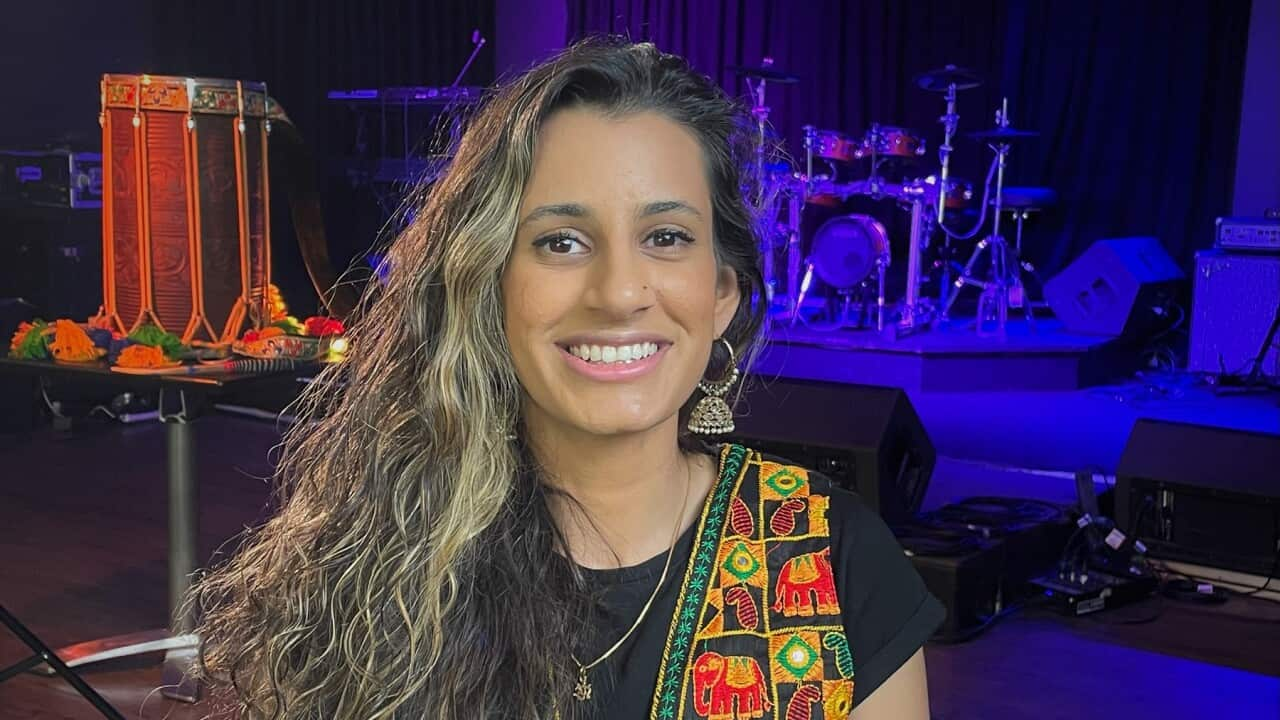TRANSCRIPT
It’s the unmistakable beats of Indian music.
The sound of the dhol, or two-headed drum, is a call to dance and celebrate, from weddings to festivals and events for Diwali.
Dhol player Priya Gakhar explains:
"It's a traditional Punjabi instrument, very important for our culture. It’s made out of wood. It's one side is with animal skin, the other side is with tin. It's generally played at weddings."
The dhol is heavy and until recently, played in public mainly by men – but that’s slowly changing.
Priya Gakhar is among a small number of women in Australia making a name, while beating a new career path.
"Playing the dhol it's a really nice way for me to connect with my Punjabi heritage. I love playing it, I love kind of breaking barriers because it's generally men who play, so people get surprised that a female is playing and I love doing that. I love kind of breaking the stereotypes."
In fact, Ms Gakhar is booked for a range of Diwali festivals around Australia, and calls for other events are rolling in.
The 28-year-old says a long performance can be challenging.
"My dhol weighs about eight kilos, I'm about 45 kilos, so it's quite heavy. Very physically taxing. My shoulder and my back will get sore after about 10, 15 minutes of playing. And then sometimes I've had to play for two hours straight - but it's worth it for the joy that I get from playing and the joy from … bringing joy to other people."
Ironically, Ms Gakhar says building muscle strength and stamina is a welcome benefit of playing dhol.
She is gradually recovering from a potentially life-threatening condition.
Symptoms increased in 2018, while she was playing semi-professional soccer in the United States.
"I was training and I was noticing that I was short of breath, I had a pain in my leg, I had chest pain which would come on and off and I knew something was a bit off - I was fatigued. And I flew back for what was meant to be a three-month holiday, turned into a five-year stint in Australia. I was diagnosed with blood clots in my lungs, a multiple bilateral pulmonary embolism. I had about 12 sausage shaped blood clots in my lungs."
Blood-thinning treatment followed and, after the onset of the pandemic, Ms Gakhar was advised not to get vaccinated.
So during her long recovery at home, she took up dhol playing.
"I started looking at YouTube videos and just kind of picked it up and it was very therapeutic and it was a great way for me to kind of keep my spirits up when I was sick. And my parents have been very supportive. They're very happy to see what I'm doing and it brings them a lot of joy!"
Ms Gakhar says dhol playing is a vigorous workout and credits her new passion with helping to rebuild her physical and mental strength.
"I'm not a hundred per cent yet with my health, but I think dhol has really helped me push myself with my fitness and my strength and honestly it's great cardio."
Although Ms Gakhar is breaking new ground for women, she says not everyone agrees with her new career choice.
"Traditionally in Indian culture it's still pressure to go to uni, get a job, get married, settle down. So I've even had comments that I should look at getting married and that I should stop playing the dhol and that might have to get a real job and that when I get married I won't be able to play the dhol, which I just laughed at."
Fellow female dholi Tika Karan would like men to be more welcoming of women playing dhol on stage and at events.
"Since it is a male dominated industry and people have been playing this for a very long time for all of a sudden a female dholi to show what she can do I felt as if the male dholis were feeling fearful that ‘oh there’s a new female dholi in town’ potentially our jobs will be kind of taken."
With more women learning to play dhol, multi-instrument coach at Sydney’s Big Music School and Studios, Kelly Legg, says gender stereotypes are gradually shifting when it comes to learning a whole range of musical instruments.
"I mean music's music… none of these instruments or skills are gendered. In the past drums, bass, electric guitar has been really male-dominated and genres like rock, the heavier music. But we are really seeing a lot more women and non-cis males come to the stage and everyone can have a go."
Ms Gakhar loves to perform and hopes by breaking down barriers, she'll help to inspire many other girls to pick up a dhol.
“Every time I hear the sound of the dhol I love it, I want to dance, I want to play I just .. it starts like a little fire inside of me and I think me doing what I'm doing is something - it's rare. It is rare. Female playing the dhol is just a symbol in itself of female empowerment."













